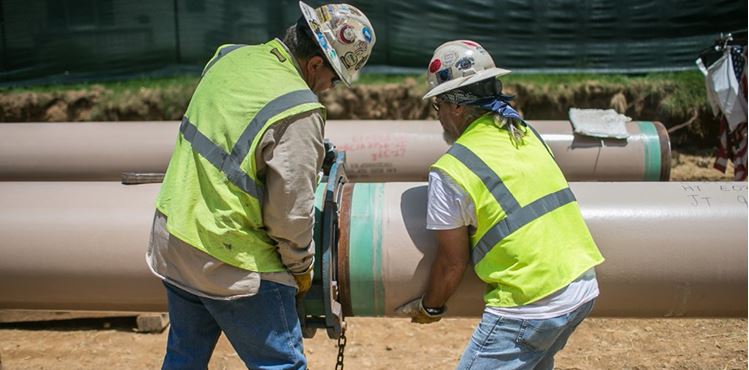State Approves Pipeline Modification As Part of Marsh Creek Settlement

In the wake of last year’s spill of non-toxic drilling fluid into Marsh Creek, Energy Transfer — the company building the Mariner East 2 pipeline — went to the state and asked for a modification to its permit, essentially saying, “Let us finish the final section of this $2.5 billion, 350-mile project using traditional open cut trenching rather than the horizontal directional drilling (HDD) we’ve been using.”
On Monday, the state Departments of Environmental Protection (DEP) and Conservation and Natural Resources jointly announced they had reached an agreement with Energy Transfer that allows the major modification. The agreement also permits a minor adjustment to the pipeline’s final path in Upper Uwchlan Township in Chester County.
As a result, after years of heated opposition from green activists, the completion of the Mariner East 2 pipeline is now all but certain.
“We are pleased that our permit modifications have been approved for the installation of our final pipeline segment in Chester County,” ET’s Lisa Coleman said in a statement. “Once installed, construction of the full Mariner East pipeline will be complete, of which the majority is already in service.”
The modification was part of a larger settlement to address the damage done in the Marsh Creek area during the HDD process. The company is paying a $4 million fine and has agreed to “dredging at minimum the top 6 inches of sediment in about 15 acres of Ranger Cove” at Marsh Creek State Park. The company will also make some cosmetic repairs to the area and pay a civil penalty of $341,000 to the Clean Water Fund.
Ironically, ET chose the more expensive and complex HDD process, as opposed to the traditional open-trench system, in an attempt to reduce the impact of the pipeline’s construction on local communities.
For supporters of the pipeline and the energy jobs it supports, the settlement is viewed as a win.
“This modification has broad support because it’s best for the community, good for the environment, and safe for workers,” said Kurt Knaus, spokesman for the Pennsylvania Energy Infrastructure Alliance (PEIA). Knaus also notes that, if pipeline opponents hadn’t continued their “delay-at-all-costs” strategy, the pipeline could be delivering propane to southeastern Pennsylvania right now.
“The news of this approval comes at a time when many Pennsylvanians are worried about rising energy prices,” Knaus said. “Mariner East delivers valuable natural gas resources like propane, which heats homes and powers businesses.
“Our hope was that this project would have been completed by the onset of the colder winter months when the market needs it most, but the delay in the permit approval makes this improbable. At least now we can finally get to work to finish this project and soon realize its full potential in Pennsylvania,” he said.
Critics of the project dismiss any local impact on energy supplies, claiming that most of the products that make it to the Marcus Hook Terminal are exported abroad. In fact, according to ET more than 44 percent of the propane sold from Marcus Hook stays in Pennsylvania. And more than 90 percent stays within the four-state region (Pennsylvania, Delaware, Maryland, and New Jersey).
While other forms of natural gas liquids (NGLs) that come through the facility may be mostly sold as exports, “the volume of propane sold from truck racks at Marcus Hook every day is enough to meet up to 22 percent of Pennsylvania’s total propane demand in winter months,” ET reports. It’s a valuable resource should there be a repeat of the 2014 polar vortex, helping prevent the skyrocketing costs and lack of supply.
However, as recently as October 28, local Democratic state Reps. Dianne Herrin, Danielle Friel Otten, and state Sen. Katie Muth were still demanding the state shut down the entire pipeline, even in the face of rising energy costs and predictions of winter supply shortages.
“I am once again calling on Gov. Tom Wolf, the DEP, and the PUC to revoke Energy Transfer’s permits to operate in Pennsylvania,” Friel Otten said.
Thanks to Monday’s settlement agreement, that is highly unlikely to happen.
“The NGLs transported through Mariner East are critical to our supply chain as the building blocks used to manufacture the products we use daily,” Coleman said. “Also part of today’s approval is our agreement with the DEP and Department of Conservation and Natural Resources to remediate and restore the impacted portion of Marsh Creek Lake that occurred in August 2020 during pipeline construction. We look forward to working with them on this restoration effort.”
Follow us on social media: Twitter: @DV_Journal or Facebook.com/DelawareValleyJournal


